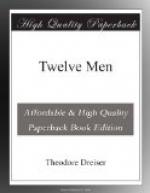She had once “run” a restaurant in a Western mining camp, had then or later carried him as a puling baby under her shawl or cloak across the Mojave Desert, on foot a part of the way. Apparently he did not know who his father was, and he was not very much concerned to know whether she did or not. His father had died, he said, when he was a baby. Later his mother, then a cook in some railroad hotel in Texas, had sent him to school there. Later still she had been a “bawler out,” if you know what that means, an employee of a loan shark and used by him to compel delinquent, albeit petty and pathetic, creditors to pay their dues or then and there, before all their fellow-workers, be screamed at for their delinquency about the shop in which they worked! Later she became a private detective! an insurance agent—God knows what—a kind of rough man-woman, as she turned out to be, but all the while clinging to this boy, her pet, no doubt her dream of perfection. She had by turns sent him to common and high school and to college, remitting him such sums of money as she might to pay his way. Later still (at that very time in fact) she was seeking to come to New York to keep house for him, only he would not have that, perhaps sensing the need of greater freedom. But he wrote her regularly, as he confessed to me, and in later years I believe sent her a part of his earnings, which were to be saved by her for him against a rainy day. Among his posthumous writings later I found a very lovely story ("His Mother"), describing her and himself in unsparing and yet loving terms, a compound of the tender and the brutal in his own soul.
The thing that always made me hope for the best was that at that time he was not at all concerned with the petty little moralic and economic definitions and distinctions which were floating about his American world in one form and another. Indeed he seemed to be entirely free of and even alien to them. What he had heard about the indwelling and abiding perfections of the human soul had gone, and rightly so, in one ear and out the other. He respected the virtues, but he knew of and reckoned with die antipathetic vices which gave them their reason for being. To him the thief was almost as important as the saint, the reason for the saint’s being. And, better still, he had not the least interest in American politics or society—a wonderful sign. The American dream of “getting ahead” financially and socially was not part of him—another mark royal. All life was fascinating, acceptable, to be interpreted if one had the skill; it was a great distinction to have the skill—worth endless pains to acquire it.




